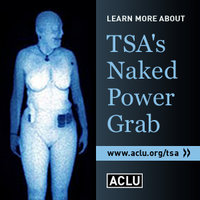
Yesterday, in a , Secretary of Homeland Security Janet Napolitano made a plea to the American public to cooperate with the Transportation Security Agency's (TSA) efforts to virtually strip-search air travelers this holiday season. In her piece, she repeated misleading and inaccurate claims about the effectiveness of strip-search machines ÔÇö a.k.a. advanced imaging technology (AIT) machines ÔÇö and what the government is doing to make sure that the naked pictures they are taking of you remain private.
AIT machines are safe, efficient, and protect passenger privacy AIT screenings have illustrated their security value time and again The imaging technology that we use cannot store, export, print or transmit images.
The truth behind this bit of spin is that the jury is still out on the effectiveness of these machines or whether they justify the invasion of privacy involved. The Government Accountability office said earlier this year "it is unclear whether the AIT or other technologies would have been able to detect the weapon Umar Farouk Abdulmutallab [the attempted 2009 Christmas day bomber] used in his attempted attack. "Experts explosives can be hidden by being molded against the human body, or in folds of skin. British newspapers that government testing in the U.K. found that the technology comes up short in detecting plastic, chemicals and liquids.
The more startling inaccuracy is the oft-repeated claim that these machines cannot store or transmit the revealing images of travelers that they create. According to published reports, this is simply untrue. By filing Freedom of Information Act requests, privacy advocates discovered that that all body scanners it purchases be able to store and send images when in "test mode." The U.S. Marshals Service when it admitted that it had surreptitiously retained more than 35,000 images made from a similar scanning device in a Florida courthouse. What's to stop the TSA ÔÇö or an unscrupulous TSA employee ÔÇö from doing the same with the naked images they take of you? There is no law or regulation that governs how body scanners are used ÔÇö just TSA policy which can be changed at any time.
Meanwhile, complaints about the TSA's enhanced security procedures have been pouring in from around the country. A being threatened with a lawsuit and $10,000 fine for refusing to submit to either a strip-search scan or an aggressive groping of his "junk" ÔÇö even though he had decided to forgo the trip and was leaving the airport. A woman from New Hampshire asked to opt-out of a body scan at the Miami airport, and , ripping up her ticket, and calling Miami police to escort her from the airport. And thousands of you have read our previous post about men who have opted out of the scan and subsequently encountered "the Resistance."
With the holiday travel season fast approaching, we want you be prepared when you get to the airport and have to make a choice between a virtual strip-search and a really aggressive groping. Visit our info page to find out more about TSA travel abuses, and by telling Congress you want them to act.
If you've been forced through an AIT or want to report abuse during airport passenger screening, . We're collecting individuals' stories in order to determine the scope of this problem and evaluate future action. The information you provide in this questionnaire will be kept confidential unless we contact you and obtain your permission to share it with others.
Related Posts:
- TSA Meets "Resistance" with New Pat-Down Procedures
- Body Scanners: Known Unknowns
- "Sexytime Pat-Downs," or an Invasion of Privacy?
- └¤░─├┼┐¬¢▒¢ß╣¹ Opposes Body Cavity Searches For All Airline Passengers
- Getting Naked with Strangers May Be More Dangerous Than Suspected
- Body Scanner Humiliation Reportedly Sparks Alleged Assault

